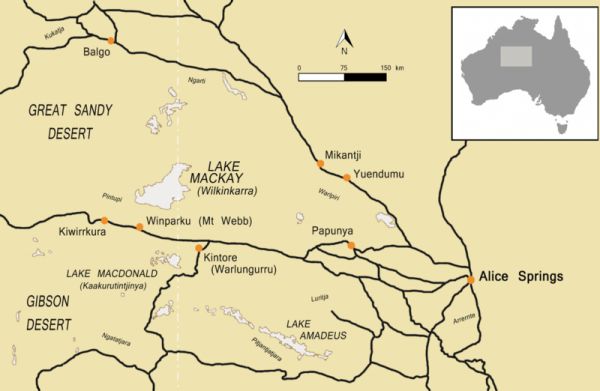
A
family of Australian Aboriginal people lived all alone in the desert
for decades, until 1984. The group, called the Pintupi Nine, were nomads
roaming the Western Desert of Australia, cut off from not only white
civilization, but also from other Aborigines. In the 1950s, Australia
conducted missile tests in the desert, and rounded up the Pintupi people
who lived there for resettlement. One family was overlooked, and lived
off the land, wandering from water hole to water hole. Gradually, the
Aborigines were allowed to return to their homelands, but the Pintupi
settlement Kiwirrkurra wasn’t built until 1984. The isolated family by
then consisted of two women and their seven teenage children, who had
never seen an automobile or a person wearing clothing before. The oldest
brother, Warlimpirrnga, remembers the day he and his brother Thomas
approached a couple of men who were camping.
"We had
just speared a kangaroo. We could smell the faeces of other humans in
the air" - they were probably a couple of kilometres away - "and we saw
smoke in the distance.
"We moved closer and stood on a rock and
could see people camping down below. So I began to move closer to their
camp. I ran towards where they were standing. Then I snuck over closer. I
coughed. The people heard me. It looked like they were scared. They
became frantic, running back and forth," he says.
"This is my
grandfather's land," Warlimpirrnga said. One of the men started filling a
billycan with water for them. "When he did, we thought, we won't spear
him," says Warlimpirrnga. "They were so scared. They were really scared
of us, scared out of their wits."
The campers were a Pintupi man,
Pinta Pinta, and his son, Matthew, who had decided to set up an
outstation at a place named Winbargo, 45km from Kiwirrkurra. The young
man panicked and fired a shotgun in the air - all parties scattered, and
the two men drove off at speed, despite a flat tire.
Read the story of how the Pintupi Nine were integrated into the community and into the modern world at
BBC News Magazine.
 A
family of Australian Aboriginal people lived all alone in the desert
for decades, until 1984. The group, called the Pintupi Nine, were nomads
roaming the Western Desert of Australia, cut off from not only white
civilization, but also from other Aborigines. In the 1950s, Australia
conducted missile tests in the desert, and rounded up the Pintupi people
who lived there for resettlement. One family was overlooked, and lived
off the land, wandering from water hole to water hole. Gradually, the
Aborigines were allowed to return to their homelands, but the Pintupi
settlement Kiwirrkurra wasn’t built until 1984. The isolated family by
then consisted of two women and their seven teenage children, who had
never seen an automobile or a person wearing clothing before. The oldest
brother, Warlimpirrnga, remembers the day he and his brother Thomas
approached a couple of men who were camping.
A
family of Australian Aboriginal people lived all alone in the desert
for decades, until 1984. The group, called the Pintupi Nine, were nomads
roaming the Western Desert of Australia, cut off from not only white
civilization, but also from other Aborigines. In the 1950s, Australia
conducted missile tests in the desert, and rounded up the Pintupi people
who lived there for resettlement. One family was overlooked, and lived
off the land, wandering from water hole to water hole. Gradually, the
Aborigines were allowed to return to their homelands, but the Pintupi
settlement Kiwirrkurra wasn’t built until 1984. The isolated family by
then consisted of two women and their seven teenage children, who had
never seen an automobile or a person wearing clothing before. The oldest
brother, Warlimpirrnga, remembers the day he and his brother Thomas
approached a couple of men who were camping.
No comments:
Post a Comment